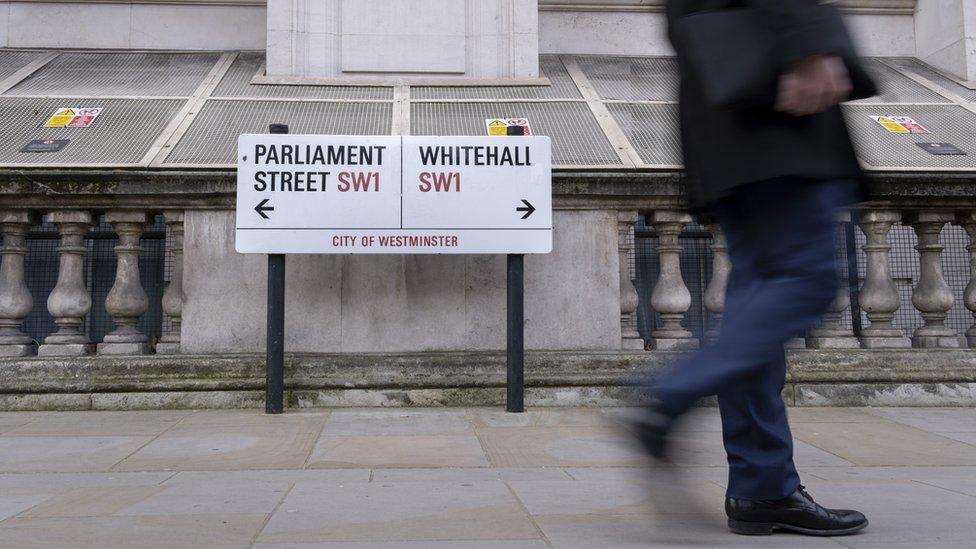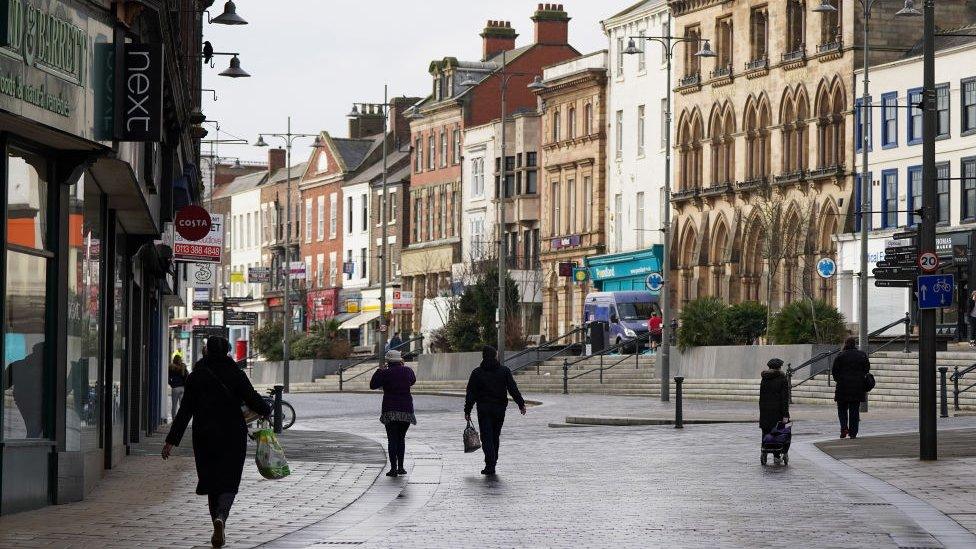No progress moving civil servant jobs out of London, report says
- Published

The UK government has made little progress towards its goal of moving civil servants out of London, a think tank has said.
Onward said new posts in the capital have grown at twice the rate of other regions since a review of government buildings announced in 2018.
It also found the senior civil service remained "particularly London-centric".
The government said it was making "good progress" towards its plan to shift 22,000 jobs out of London by 2030.
The push to relocate civil servants has received renewed focus in recent years, as part of the government's "levelling up" agenda.
In a report entitled Time to Move Out, external, the centre-right Onward think tank argued moving civil servants to regions outside London could improve growth and decision-making.
But the report - co-written by Will Tanner, an adviser to former PM Theresa May - said emergency recruitment to respond to Brexit and the Covid pandemic had concentrated the workforce in London.
It added it was not clear why an "increasing share" of the recruitment in recent years had been concentrated there.
The report found that since 2018, when the government announced a plan to make the Civil Cervice less London-centric, the number of jobs based in the capital had grown by 22%, compared to 11% in other areas of the UK.
The analysis also found that:
More than nine in 10 civil servants in the Treasury and business and culture departments were based in London
Nearly two-thirds of senior civil servants were based in London, up from 60% in 2015
Since 2006, the overall civil servant headcount had risen by 50% in London, compared to 3% as a whole
To reverse the trend, the authors said, the government departments should aim to have no more than two-thirds of staff in London by 2030.
Writing in the report, Jamie Driscoll, Labour mayor of the North of Tyne, argued that "all the big decisions still happen in London".
"When places like Newcastle see ministers, it's in hard hats for photo opportunities... If we had ministers working here for a week every month, we'd finally be in touching distance of joined up government that can deliver levelling up," he added.

Some Treasury staff will be based in Darlington rather than Whitehall
The report recommended the government publish league tables setting out progress towards reaching these targets, and that departments falling short should adopt a "one-in, two-out rule".
This would prevent departments from advertising for an additional London-based job until two roles had either been relocated or recruited outside London, it said.
The report also suggested ministers and civil servant bosses should work at least one day a week or one week per month at a regional Civil Service campus.
And it said bodies such as the Government Digital Service, the Crown Commercial Service and UK Export Finance should be moved out of London.


Shifting civil service roles outside London has been a key plank of the government's plan to spread opportunity more equally around the country.
The idea is to both create jobs and move decision-making closer to local communities. But this report suggests progress has been slow, highlighting parts of government where more jobs have been created in London than outside in recent years.
The government points out the fact that the Civil Service has had to adjust for Brexit and the pandemic, saying the figures don't take into account the renewed push to decentralise the civil service, which has recently seen 2,000 roles relocated outside of London - some on new government sites.
It's true that setting up new jobs and recruiting people to fill them does take time. But this issue speaks to what is perhaps the core challenge of the whole "levelling-up" agenda.
It makes big promises that depend on big shifts in the way the government and the economy works - and making those promises a reality is far from simple, and takes time. The key political question is how long people are willing to wait.

Responding to the report, a government spokesperson said the figures cited "do not fully reflect the performance" of its relocation programme.
They added that a 10-year plan to relocate roles outside London was making "good progress", with more than 2,000 roles already relocated and 15,000 roles "committed to move".
"Departments have moved quickly to establish second headquarters outside of London, including in Darlington, Glasgow and Wolverhampton," the spokesperson added.
Levelling Up Minister Eddie Hughes said the report highlighted the need for "further work".
Related topics
- Published2 February 2022
